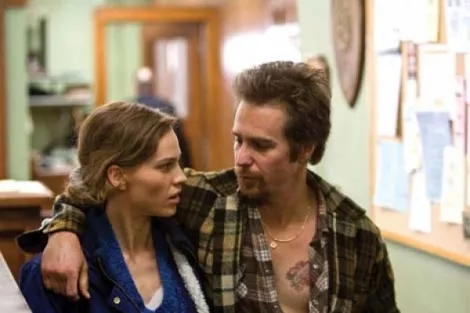
- Fox Searchlight
- Conviction
To clarify further, it’s not that the actual human lives that inspire movies like Conviction aren’t genuinely inspirational. Those people may indeed have accomplished remarkable, praiseworthy things. But that’s not the same thing as being the stuff of which a remarkable, praiseworthy movie is made—and Conviction’s most noteworthy achievement is making me want to read a really good book about the same story.
The fact-based tale opens in Ayer, Mass., in 1980, where a woman has been robbed and murdered in her home. A local troublemaker named Kenny Waters (Sam Rockwell) becomes an early suspect, but no evidence appears linking him to the crime—until two years later, when two women both step forward to claim he confessed. When he’s convicted of the crime in 1983, his sister Betty Anne (Hilary Swank) becomes driven to prove his innocence—even if it means that the high school dropout will have to take her GED, go to college, get into law school, become a lawyer herself and enlist the aid of attorney Barry Scheck’s (Peter Gallagher) Innocence Project to see that justice is done.
It’s a staggering concept, the notion of a single mother spending 16 years of her life building toward the opportunity to exonerate a family member and right a wrong. Director Tony Goldwyn and screenwriter Pamela Gray—who worked together on Goldwyn’s 1999 directing debut, A Walk on the Moon—do a fine job of establishing the friendship between Kenny and Betty Anne that makes her extraordinary self-sacrifice plausible. In flashback, we see the childhood connection between the siblings, forced to rely on one another thanks to the neglect of their absentee mother (Karen Young). A bond that might have been disposed of in a single, rushed scene is given plenty of time to develop here. If nothing else, Conviction never leaves any question that these are two people fiercely devoted to one another.
But it’s also a movie that’s built on a very specific formula, one that probably finds its most familiar recent antecedent in Erin Brockovich—the tale of a crusader for justice whose sacrifices cause loved ones to express frustration at her/his alienating single-mindedness, and skepticism that the years of effort will ever see results (see also: Flash of Genius). And Conviction moves dutifully through every bullet point on the “based on a true David vs. Goliath story” to-do list: the scene where the protagonist’s romantic interest says something along the lines of, “You care more about this case than about your own family!”; the moment of despair when it seems as though no possible happy ending can come; the improbable reversal of fortune that gives our protagonist hope. Inspiration is an emotional reaction, and there’s only so much genuine emotion a story can generate while you’re listening to the grinding of the gears.
Of course, formulas, regardless of the genre, are formulas for a reason—because they’re often effective. Mostly, though, they’re effective as a framework that depends on the specifics of execution, whether it’s the performances or the filmmaking aesthetics. And Conviction spends too much time on the square-jawed determination of Swank’s Betty Anne, gnawing on a working-class New England accent and shoving her way past a variety of obstacles. There just isn’t enough about the storytelling rhythms or the specifics of Betty Anne’s quest to overcome the sense of sameness.
There are glimpses of what could have been distinctive about Conviction in a pair of performances. Juliette Lewis gets a juicy role as one of the prosecution’s witnesses, mostly a single scene of gleeful white-trashiness. And Rockwell does a great job of conveying Kenny’s evolution from rowdy, far-from-completely-upstanding guy to despairing longtime convict unable to handle the glimpses of hope he gets over the years. Those are the moments when we see fragments of something real, something that could be developed into a fascinating nonfiction account. The cramped two hours of Conviction can’t hold that story effectively, not while the work of fitting it into a pre-determined box leaves us with 5 percent inspiration and 95 percent perspiration.
CONVICTION
![]()
Hilary Swank, Sam Rockwell, Minnie Driver
Rated R
|
Scott Renshaw
|